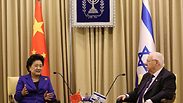
Israel and China deepen economic and cultural ties
Officials from Israel and China are discussing arrangements for a free trade agreement, which is expected to further cement economic ties between the two countries.
Twenty-five years ago, when Israel and China established diplomatic relations, the trade volume between the two countries was $50 million. Today it is over $11 billion, meaning it has increased more than 200 times in the last 25 years.
There is more and more Chinese investment in Israel, and more Israeli companies are opening offices in China.
“Our two economies are highly complementary, which means a great potential of deeper and wider cooperation,” Chinese Ambassador to Israel Zhan Yongxin said at an event marking the anniversary of the establishment of diplomatic relations held at the Hebrew University in Jerusalem. “Israel is a nation well known for innovation and advanced technology. China has a huge and open market as well as exceptional manufacturing capabilities. Our cooperation will greatly benefit both countries.”

Officials from both countries are discussing arrangements for a free trade agreement, which will further cement ties. In 2015 the Chinese company Bright Food acquired Tnuva, an iconic Israeli dairy company.
Ambassador Yongxin said that about 80,000 Chinese tourists visited Israel last year, and more are on the way.
“There is an increasing interest in coming here as tourists,” Orna Naftali, a professor of anthropology in the department of Asian Studies at Hebrew University, told The Media Line. “There is now an interest among middle class Chinese who have already been around the world and now have a taste for somewhere that’s different. If there is a stereotype it is that Jews and Israelis are very smart and we have a lot to learn from them.”
This admiration is especially welcome in Israel which is often criticized in the international community for its policies in the West Bank. As European countries become more critical of Israel, with calls for boycotts of Israeli products manufactured in the West Bank, more Israelis are turning to Asia.
East Asian studies has exploded at Israeli universities. Noam Rose-Weiss and Gal Litani, both students, sang several songs in Chinese at the Hebrew University event. In the middle of their second year of studies, their Chinese is coming along well, and they have plans to visit China this summer.
“I started in mechanical engineering but I soon realized it wasn’t for me,” Litani said. “Since I was 12 years old, my father has been telling me I should study Chinese, so I thought I’d try it, and I just fell in love with it.”
The Chinese government has established a generous scholarship program that funds Israeli students to study in China, and hundreds of Chinese students are currently studying in Israel.
The deeper ties came as China has embarked on a huge program called One Belt, One Road to create a massive new trade corridor by both land and sea between China and Europe. Last year, China’s state controlled shipping company acquired ownership of Greece’s largest port of Piraeus.
Israel could play a role in this project as well, say Israeli businessmen.
“If you look at the next few years Israel has the potential for becoming a major trade gateway between Asia and Europe,” Roi Feder, the managing director of APCO Worldwide, a global communications consulting company, said. “Goods could be transferred between the southern port city of Eilat or Ashdod, and go up north to Haifa. Israel could become a logistics hub for goods being stored here.”
Right now Israel does not have the logistics, insurance or financial capabilities to become a major part of the One Belt, One Road. But as China invests more and more in Israel and as ties deepen further, Israel is well-positioned to develop ties with China even further.
Article written by Linda Gradstein
Reprinted with permission from The Media Line










